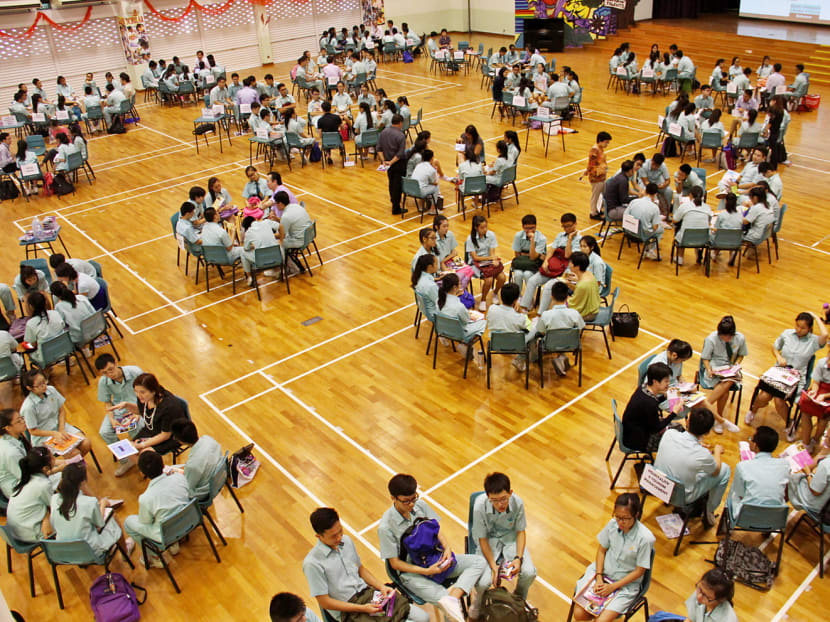‘Through-train’ programme losing popularity among N(A) students
SINGAPORE — A “through-train” programme which allows selected Normal (Academic) stream students to bypass the N-Level examinations to take the O-Level exams directly in Secondary Five is gradually falling out of favour with students, reflecting the growing popularity of other paths that allow easier entry into polytechnics.

Students and educators said the through-train programme might be deemed less attractive in comparison to other programmes, and the decline also signals a shift in students’ interests, with more now keen on the practical learning experience offered in polytechnics. TODAY FILE PHOTO
SINGAPORE — A “through-train” programme which allows selected Normal (Academic) stream students to bypass the N-Level examinations to take the O-Level exams directly in Secondary Five is gradually falling out of favour with students, reflecting the growing popularity of other paths that allow easier entry into polytechnics.
At least three secondary schools — Jurong Secondary School, Commonwealth Secondary School and Pei Hwa Secondary School — have decided to discontinue the programme, which was introduced in 2006.
This comes on the back of dwindling student numbers under the programme, from 850 in 2007 — the year the first batch of students under the programme skipped the N-Level exam — to 200 last year, according to Ministry of Education (MOE) figures.
Responding to queries from TODAY, the ministry said one possible reason is that Normal (Academic) students now have more options to choose from, such as the Polytechnic Foundation Programme (PFP) and the Direct-Entry Scheme to Polytechnic Programme (DPP), which were introduced in recent years as alternatives to a Secondary Five education.
Students and educators interviewed by TODAY concurred, saying the through-train programme might be deemed less attractive in comparison, and the decline also signals a shift in students’ interests, with more now keen on the practical learning experience offered in polytechnics.
The MOE did not reveal how many schools have opted to discontinue the programme.
Jurong Secondary School, which introduced the programme in 2006, said it was dropped last year after taking into account the wider range of choices Normal (Academic) students now have, such as the PFP and DPP.
Introduced in 2013, the PFP allows top-performing Normal (Academic) students in the N-Level exam to skip Secondary Five and undergo a foundation year in the polytechnics.
The DPP guarantees students a place in a polytechnic if they meet the qualifying grade after their two-year Higher Nitec course. On top of that, Normal (Academic) students can also sit for up to three O-Level subjects at the end of Secondary Four.
According to the MOE, about 2,000 students in total have been admitted into both the PFP as well as DPP, and nearly all students in the PFP will go on to pursue their diploma studies.
The through-train programme was introduced as part of the MOE’s efforts to provide greater flexibility in the education system.
In a press release in 2005, the ministry said the time freed up from preparing for the N-Levels would allow students to pace their learning better over five years.
Students are selected at the end of Secondary Two or Secondary Three based on their performance.
Jurong Secondary vice-principal Sheik Alaudin said that a total of 360 students from the school underwent the programme from 2006 to 2015. But over 90 per cent of its students in the programme are also already eligible for polytechnic courses.
Today, with the DPP and PFP, Normal (Academic) students have more than one route to post-secondary education. “They are also able to find fulfilment in learning, be motivated to excel in what they are good at and tap their strengths to support their post-secondary aspirations,” said Mr Sheik.
Students who have undergone the through-train programme said they were surprised as they benefited from having more time to prepare for the GCE O-Levels.
Former Jurong Secondary student Aishiwariya Manokaran, who had gone through the programme, felt schools should not phase it out.
“I think it is still useful,” the 20-year-old Ngee Ann Polytechnic student said.
A Secondary Five student from Jurong Secondary School, who did not want to be named, said the programme allowed students to keep their options open between polytechnics or junior colleges.
“I feel more assured that a place is reserved for me and that I will be able to sit for the GCE O-Level exam,” she said.
“Having the possible outcome of entering a junior college as a Normal (Academic) student … motivated me to study and achieve better results.”
Others noted that the PFP and DPP could be more relevant as students are increasingly interested in pursuing a polytechnic education.
Greendale Secondary School principal Amy Ng said that most of her students prefer the polytechnic option, and feel they “will better enjoy the more hands-on learning experiences”.
Echoing this sentiment, recent diploma graduate Emily Low, who underwent the through-train programme in Pei Hwa Secondary School said: “More of them are interested in practical learning, than studying theory.”






